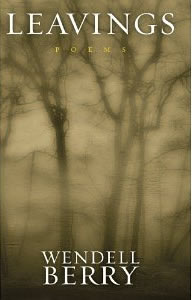Book Notes
 Wendell Berry, Leavings: Poems (Berkeley: Counterpoint, 2010), 132pp.
Wendell Berry, Leavings: Poems (Berkeley: Counterpoint, 2010), 132pp.
Wendell Berry was born in 1934 to a family that has farmed Kentucky land for five generations. After studies and travels took him to the University of Kentucky, Stanford, France, Italy, and the Bronx, in 1965 he bought his own farm near his birth place. He's been been tilling the earth and churning out books ever since then. Over fifty books of poetry, novels, essays, and short stories have earned him numerous awards as one of the leading truth-tellers of our day. Except for his comprehensive Collected Poems (2012), Leavings is Berry's most recent collection of poetry.
Readers will find here the same sort of poems that have characterized his work for fifty years: lament, outrage, prayers, love, gratitude, dreams, and a pronounced localism convinced of the power of place. Now almost eighty, a number of poems reflect on his getting older. In that sense there are no surprises; he has stayed true to a consistent vision. After thirty pages of occasional poems, the rest of the book is comprised of his Sabbath Poems (2005–2008), a series of poems Berry started writing long ago based upon his Sunday walks on his farm. These take up three-quarters of the book.
My favorite poem in this book is his "Questionnaire."
1. How much poison are you willing
to eat for the success of the free
market and global trade? Please
name your preferred poisons.
2. For the sake of goodness, how much
evil are you willing to do?
Fill in the following blanks
with the names of your favorite
evils and acts of hatred.
3. What sacrifices are you prepared
to make for culture and civilization?
Please list the monuments, shrines,
and works of art you would
most willingly destroy.
4. In the name of patriotism and
the flag, how much of our beloved
land are you willing to desecrate?
List in the following spaces
the mountains, rivers, towns, farms
you could most readily do without.
5. State briefly the ideas, ideals, or hopes,
the energy sources, the kinds of security,
for which you would kill a child.
Name, please, the children whom
you would be willing to kill.
Here we see Berry the poet as a man who prefers the "world made without hands" to "industrial humanity," which he considers an "alien species" with a death wish. And so with hard-hitting verse he asks us very pointed questions about what it means to be a whole human being in a finite world.


